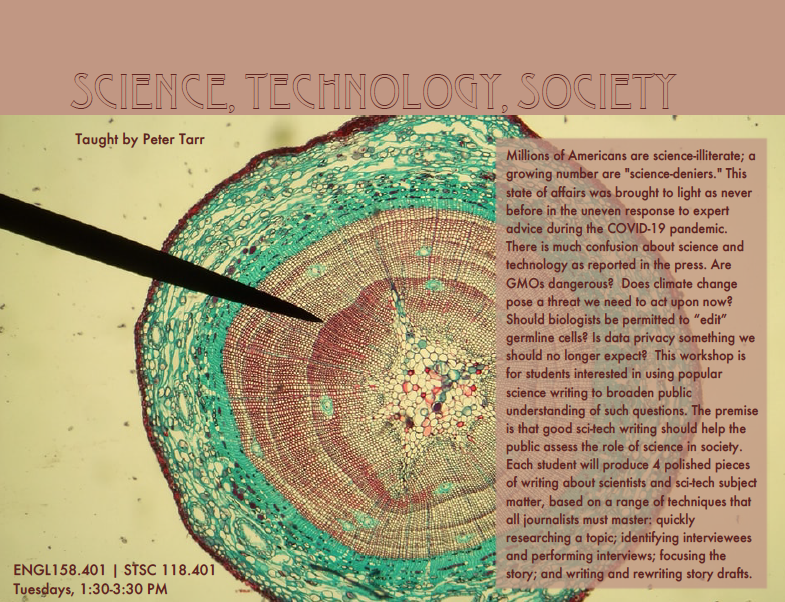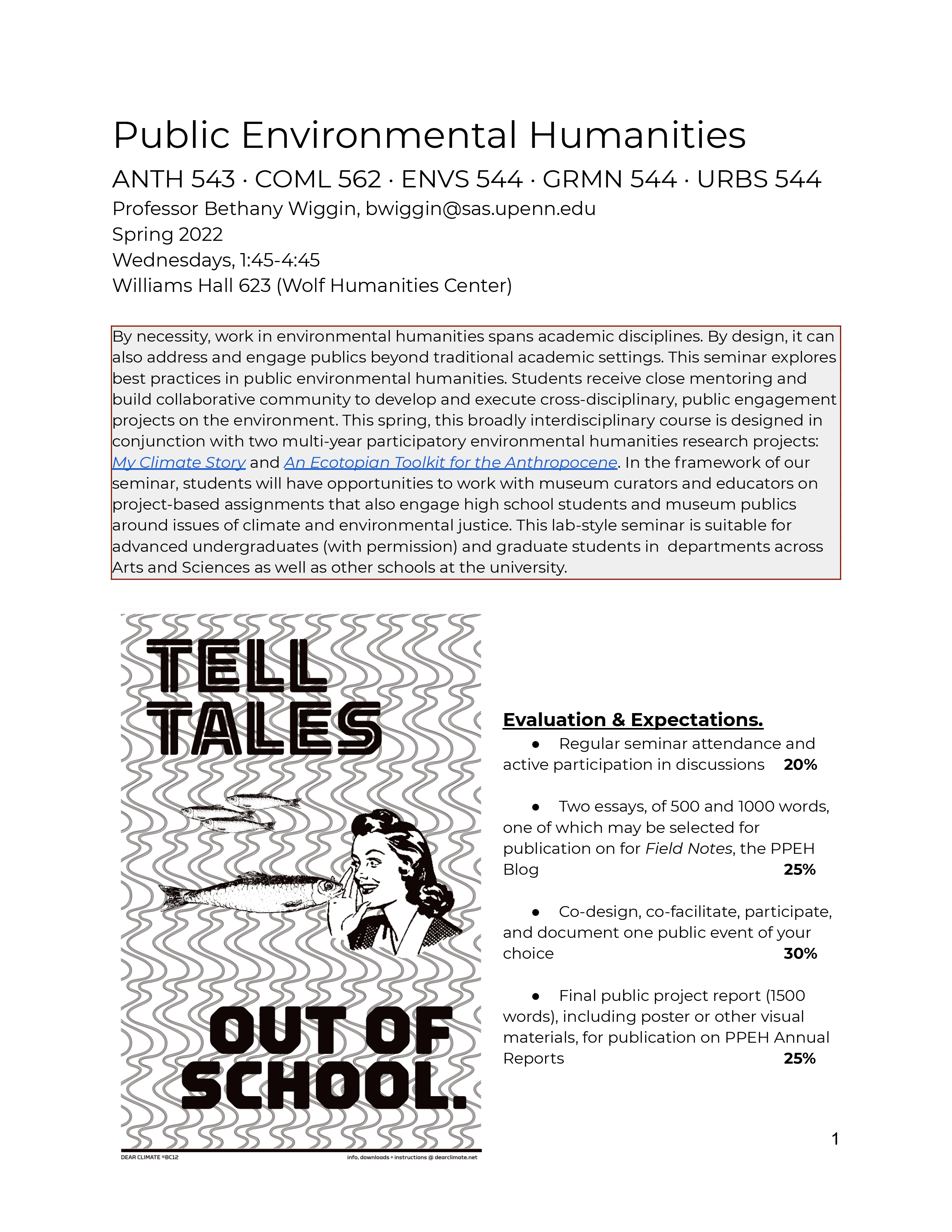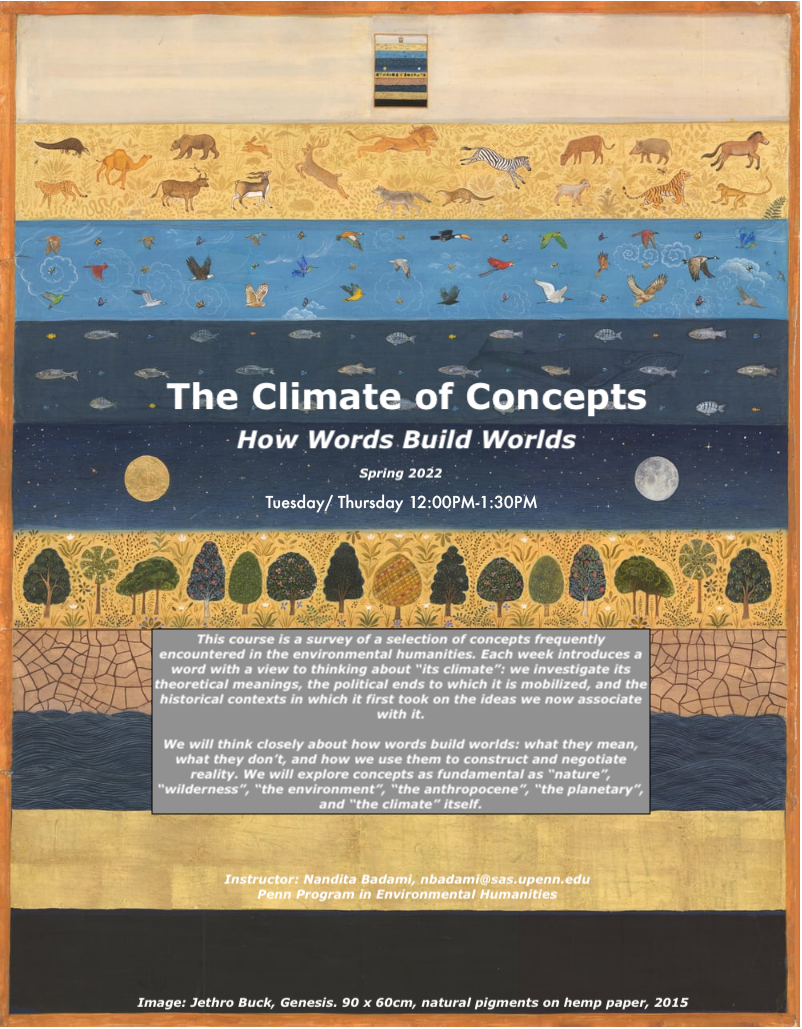Spring 2022
ENGL 158/STSC 118
Peter Tarr
Tuesdays 1:45-4:45pm

Millions of Americans are science-illiterate; a growing number are "science-deniers." This state of affairs was brought to light as never before in the uneven response to expert advice during the COVID-19 pandemic. There is much confusion about science and technology as reported in the press. Are GMOs dangerous? Does climate change pose a threat we need to act upon now? Should biologists be permitted to “edit” germline cells? Is data privacy something we should no longer expect? This workshop is for students interested in using popular science writing to broaden public understanding of such questions. The premise is that good sci-tech writing should help the public assess the role of science in society. Each student will produce 4 polished pieces of writing (3 fact-based op-eds of 750 words + a scientist-profile of 1500-2000 words) about scientists and sci-tech subject matter, based on a range of techniques that all journalists must master: researching a topic; identifying potential interviewees; focusing the story; and writing and rewriting story drafts. The object is to show improvement between first and subsequent drafts, with help from others in the workshop, who will provide periodic short critiques. [Note: The profile project will be modified to reflect what is possible under pandemic conditions.] This course is cross-listed in Science, Technology and Society as STSC 118.
This course meets both the humanities and public engagement requirements.
Spring 2022
PHIL070-301
Kok-Chor Tan
Wednesdays 5:15-7:55pm
The theme of this first-year seminar course is the ethics and politics of wildlife and environmental conservation. We will explore two sets of questions related to conservation. (i) First, what do we owe to (non-human) animals and the natural environment? For example, what intrinsic interests and rights do animals have? And is there such a thing as "the right of nature?" Do rivers themselves, for example, have rights? (ii) Second, what do we owe to each other regarding animals and the natural environment? For example, what are the societal costs of wildlife conservation and how are these to be fairly distributed? How do considerations of social justice and global justice affect our understanding of ethical conservation? What is a globally just allocation of the burdens of climate justice and environmental protection? And has global eco-tourism contributed positively to both conservation and social/local justice? Among other things, this seminar will attempt to integrate the more familiar field of animal and environmental ethics with the less explored question of the justice and politics of conservation.
Spring 2022
ANTH 543, COML 562, ENVS 544, GRMN 544, URBS 544
Bethany Wiggin
Wednesdays 1:45-4:45pm
By necessity, work in environmental humanities spans academic disciplines. By design, it can also address and engage publics beyond traditional academic settings. This seminar explores best practices in public environmental humanities. Students receive close mentoring and build collaborative community to develop and execute cross-disciplinary, public engagement projects on the environment. This spring, this broadly interdisciplinary course is designed in conjunction with two multi-year participatory environmental humanities research projects: My Climate Story and An Ecotopian Toolkit for the Anthropocene. In the framework of our seminar, students will have opportunities to work with museum curators and educators on project-based assignments that also engage high school students and museum publics around issues of climate and environmental justice. This lab-style seminar is suitable for advanced undergraduates (with permission) and graduate students in departments across Arts and Sciences as well as other schools at the university.

Spring 2022
ANTH 199
Nandita Badami
Tuesdays/Thursday, 12:00PM-1:30PM
This course is a survey of a selection of concepts frequently encountered in the environmental humanities. Each week introduces a word with a view to thinking about "its climate": we investigate its theoretical meanings, the political ends to which it is mobilized, and the historical contexts in which it first took on the ideas we now associate with it.
We will think closely about how words build worlds: what they mean, what they don't, and how we use them to construct and negotiate reality. We will explore concepts as fundamental as "nature", "wilderness", "the environment", "the anthropocene", "the planetary", and "the climate" itself.
This undergraduate level course meets for the Spring 2022 semester on Tuesdays and Thursdays from 12:00-1:30pm. Please sign up here and you will receive a confirmation and welcome from Dr. Badami before the semester begins. Registration cap: 15

Spring 2022
ANTH-564-301
Kathleen Morrison
TR 01:45 PM-03:15 PM
This seminar explores the historical ecology of European colonial expansion in a comparative framework, concentrating on the production of "periphery" and the transformation of incorporated societies and environments. We begin with a discussion of the theoretical frameworks, sources of evidence, and analytical strategies employed by researchers to address the conjunction of environmental and human history in colonial contexts, including underdevelopment and global systems of circulation; political ecology; and ecological imperialism. We then discuss the circulation of persons, crops, invasives, and microbes as fundamental conditions of emerging global systems. Drawing on these elements, we discuss landscapes as sites of misrecognition, rationalization, and cultural production. This discussion sets the stage for an examination of novel forms of economic and ecological production, including the emergence of the 'drug foods', the transformation of forest products, and the rise of the plantation. We then consider the political ecology of crisis in colonial settings, including agrarian collapse, famine, and 'ecological poverty.'
This course fulfills Social Science Approaches to Environmental Inquiry elective.
Spring 2022
PHIL-157-401
Michael Weisberg
TR 10:15 PM-11:15 PM and recitation
This course is a comprehensive introduction to the climate emergency and the tools with which we can fight it. It will integrate natural science, social science, philosophy of science, history, ethics, and policy. The course opens with an overview of the historical discovery of global warming and our contemporary understanding of climate change. We then turn to the framework that the United Nations' Intergovernmental Panel on Climate Change has developed to study climate risks, focusing on both general issues and case studies throughout the world. The existence and severity of these risks raises questions of climate justice at many levels: individuals to individuals, countries to countries, and the present generation to future generations. We will study these issues in detail, and then examine the policy tools developed to address them. Although we will discuss national and sub-national policy and policy proposals such as the Green New Deal, special attention will be given to global policy tools, especially the Framework Convention on Climate Change and the Paris Agreement. In addition to standard writing assignments, students will have a chance to develop policy proposals that address the core issues of the class.
This course fulfills Social Science Approaches to Environmental Inquiry elective.
Spring 2022
CPLN-531-001
Thomas Daniels
TR 01:45 PM-03:15 PM
Overview of federal programs for protecting air quality, water quality, and endangered species along with managing climate change, solid waste, toxics, energy, transportation, and remediating brownfields in an overall sustainability framework. State-level, local government, and NGO efforts to protect the environment are also explored as are green infrastructure and green cities.
This course fulfills Social Science Approaches to Environmental Inquiry elective.
Spring 2022
ANTH-093-401
Teresa Giménez
MW 1:45-3:15PM
This course explores the involvement of the Latinx environmental justice movement since the 1960s. It addresses theories and concepts of environmental racism and environmental justice, underscoring how Latinx have challenged, expanded, and contributed to the environmental justice discourse. In this course, students will explore national case studies of environmental and racial injustice as they bear on Latinx communities both in rural areas and in urban barrios throughout the United States. The course will analyze these case studies through the lens of Latinx artistic and literary texts (essays, paintings, short stories, documentaries, and short films) as they provide a unique historic and multicultural perspective of the Latinx experience with environmental injustice and of how Latinxs imagine alternative transitions and responses to environmental marginalization. In addition, the works of Latinx artists and writers will serve as case studies to deconstruct racial stereotypes of Latinxs as unconcerned about environmental issues, shedding light on how they share a broad engagement with environmental ideas. The case studies analyzed in this course emphasize race and class differences between farmworkers and urban barrio residents and how they affect their respective struggles. The unit on farmworkers will focus on workplace health issues such as toxic chemicals and collective bargaining contracts. The unit on urban barrios will focus on gentrification, affordable housing, and toxic substances in the home. We will also review current and past programs that have been organized to address the aforementioned problems. This is an Academically Based Community Service Course (ABCS course) through which students will learn from and provide support to a Latinx-serving organization in the City of Philadelphia on preventing exposure to hazardous substances, thus bridging the information gap on environmental justice issues in the Latinx community in Philadelphia. Information dissemination and education efforts will be conducted by collaborating with Esperanza Academy Charter School in Philadelphia to implement lessons on preventing exposure to hazardous substances. Studying environmental justice and pairing it with community service will heighten students' awareness of the complexities of culture, race, gender, and class while providing them with an invaluable experience of cross-cultural understanding.
This course is also listed as SPAN093, ENVS093, LALS093, URBS093.
This course fulfills Arts & Humanities Approaches to Environmental Inquiry elective.
Spring 2022
ARTH-292-401
Rahul Mukherjee
W 5:15-8:15pm
Documents are written texts, evidence, inscriptions, and much more. Documentary films have been used to tell stories, share experiences, spread propaganda, resist exploitation, invoke memories, and much more. How can we think of information and meaning in relation to the shared histories of document and documentary? Database management systems based on digital technologies have technically transformed ways of classifying, storing, and aggregating data, but have they really changed our experiences of mediating with our past, present, and future? Issues of agency, memory, representation, performativity, interactivity, and posthumanism are entangled in discussions of databases and archives and our engagement with them. In this course we will relate and juxtapose readings connecting documents, documentaries, and archives. We will read media and cultural theorists such as Lisa Gitelman, Akira Lippit, and Wendy Chun alongside novelists like Franz Kafka and Ismail Kadare. Assignments include one assigned/selected report from field visits to libraries and museums, one reading presentation and blogging assignment, and a final paper or practice-based art project.
This course fulfills Arts & Humanities Approaches to Environmental Inquiry elective.
Spring 2022
GSWS-565-640
Jacqueline N. Sadashige
T 7:00-9:00pm
In early 2017, animal rights lawyer Steve Wise argued that two of his clients should be afforded the rights of "personhood." The clients in question were chimpanzees. This case suggests that "speciesism" might soon be met with the same degree of suspicion as sexism and racism. This course will explore how such a shift could come about and what it might signal. We will begin by examining the western foundations of binaries such as human-animal, male-female, and self-other. From here we will explore recent attempts to dismantle these constructs by ecofeminists and post-humanists. We will also look at how such categories have manifested in social movements and cultural artifacts. Finally, we will investigate how our beliefs about who "we" are and what "we" are not can affect everything from the foods we eat to where and how we vacation. Undergraduates require approval.
This course fulfills Arts & Humanities Approaches to Environmental Inquiry or Social Science Approaches to Environmental Inquiry elective.
